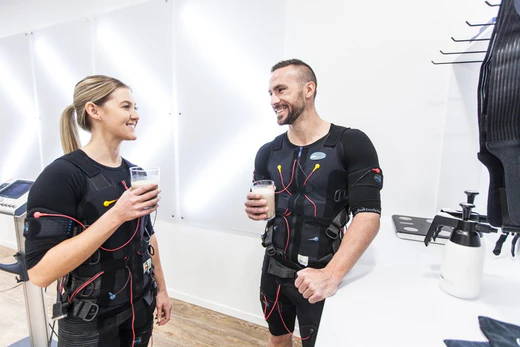the one thing we are adding to every meal
by team nuut

If you’re feeling the pinch, lagging in energy, constantly snacking, or feeling exhausted post-workout, you are probably lacking one thing – good protein.
Because our bodies are unable to store protein to use later, and the protein we do have is contained in structures like muscles and tissues that is constantly being turned over, it’s important to consume the right amount of quality protein daily.
But which type of protein is best, how much should we consume, and how much is too much?
We grilled Clinical Nutritionist Kayla Braithwaite from SpeedFit.
Why do our bodies LOVE protein?
Kayla Braithwaite (kb): Protein provides our bodies with structure and essential building blocks for optimum health. Protein not only assists building and maintaining muscle, but actually helps form muscle, hormones, tissues and cells. It keeps our immune system healthy and provides stability for our nervous system. Our body is constantly breaking away and rebuilding muscle throughout the day, so our body’s systems need replenishment to help keep these systems working optimally.
Can consuming protein actually help us lose weight?
(kb): Yes! Protein plays a major role in appetite regulation because it helps keep you full, which in turns, reduces overeating and cravings. Protein and resistance training are the perfect pair - you can’t have one without the other. In order to support the maintenance and production of lean muscle mass, you need to engage in resistance-based exercise and eat adequate protein. We want to maintain a good amount of lean muscle mass when exercising as this is what helps us to burn energy effectively whilst supporting a healthy metabolism. Protein also supports muscle recovery. Our clients especially notice this after a SpeedFit session. When recovery takes longer post-workout, you know you are lacking in protein.
How much protein should we aim to have every day?
(kb): It depends on your lifestyle, health and fitness goals. To maintain good quality lean muscle mass, eating at least 1.2g of protein x your body weight will support this maintenance and ensure you don’t break away at muscle mass on a daily basis. If you are engaging in physical activity like resistance training, your body requires slightly more, so aim for 1.2 -1.5g of protein x your body weight.
choose your protein

Is it possible to eat too much protein?
(kb): Yes, too much protein is simply excreted from the body and not used. We want to optimise the food we consume, so overeating protein puts pressure on our detoxification pathways because it has to break down and get rid of excess protein. If we are overeating protein, we are usually undereating other important macro and micronutrients needed to support a healthy diet. All macro and micronutrients are needed for different mechanisms in the body and lacking in one and overeating in another is where dysfunction and imbalance can occur.
How can we make sure we are eating enough protein daily?
(kb): An easy way to ensure you eat enough is to ensure you are including a protein source in each main meal and at snack time. Aim for unprocessed wholefood sources where possible, and when looking at your plate aim to have a quarter of it filled with a lean protein. Including a variety of animal and plant-based protein sources is the best way to include protein in your diet. Different protein sources provide different amino acid profiles and different micronutrients. Good quality nutrient-dense protein sources include eggs, chicken, turkey, locally-caught small white fish, wild-caught fat fish, legumes, non-GMO tempeh, naturally sweetened and minimally processed protein powder, and grass-fed beef.
Is plant-based protein as effective as animal?
(kb): It can be, providing you consume a variety of plant-based protein sources throughout the day to ensure you get all the amino acid profile needed. Plant-based protein also provides a lean protein source because it is predominantly low in saturated fat and high in dietary fibre. Not only is plant-based protein lean and low in calories, it provides a food source for our gut bacteria to thrive off which means we can nourish our muscles along with our digestive system.
nuut is the ideal plant protein-on-the-go. When do you nuut for optimum health and energy?
(kb): I have been enjoying nuut after my morning SpeedFit workout. It’s a great way to squeeze in extra protein and is an easy breakfast alternative that tides me over to lunch. It’s really filling. Instead of a coffee mid-afternoon, I also have a nuut in the afternoons as a snack between lunch and dinner. It gives me more sustainable energy throughout the afternoon then reaching for a coffee.
How do you nuut?
(kb): I really enjoy my nuut blended up thick with cold water, or for a more filling smoothie I add half a small frozen banana and 1 teaspoon of natural peanut butter. It’s a great combo!